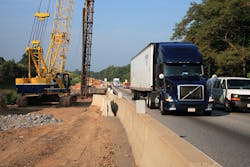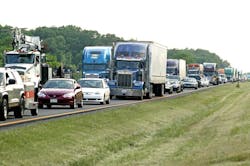The debate over how to provide a stable long-term source of funding for U.S. roadway infrastructure needs continued this week before the House of Representatives’ Ways & Means Committee, with advocates from across the transportation spectrum calling up Congress to settle on a funding mechanism and to do so soon.
“For almost 60 years, the Highway Trust Fund (HTF) provided stable, reliable and substantial highway and transit funding,” John Cox, president of the American Association of State Highway and Transportation Officials (AASHTO) and director of the Wyoming Department of Transportation.
“However over the past seven years this has not been the case,” he pointed out. “Since 2008, almost $62 billion have been transferred from the general fund to the HTF to keep it solvent ... and the HTF will likely again run out of money later this summer.”Bill Graves, president and CEO of the trade group American Trucking Associations (ATA), also stressed that “it is important for all to understand” that the decisions made by the Ways & Means Committee over the next few months will have effects beyond the immediate HTF solvency issues.
“The federal commitment to investment in transportation, if not properly addressed this year, could be placed in jeopardy for many years, or even decades, to come,” he noted. “This is not just an esoteric debate about a line item in a budget. Congress’ actions have real consequences, and the decisions this Committee makes will determine whether a business succeeds or fails and whether a job is created or eliminated.”
“There is ample documented evidence that shows infrastructure investment is critical for long-term economic growth, increasing productivity, employment, household income, and exports,” echoed AASHTO’s Cox. “Conversely, without prioritizing our nation’s infrastructure needs, deteriorating conditions can produce a severe drag on the overall economy. Whichever revenue tools are utilized, at a minimum, it is crucial to identify solutions that will sustain … surface transportation investment in real terms.”
ATA’s Graves noted in particular that interstate highway traffic congestion alone cost the trucking industry $9.2 billion in 2013 and wasted more than 141 million hours – the equivalent of 51,000 drivers sitting idle for a full working year.“While the trucking industry already makes a substantial contribution to the HTF, clearly federal investment is falling short, and we are therefore willing to support an even greater commitment,” he stressed.
Graves highlighted several funding mechanisms Congress could deploy to adequately replenish the HTF over the long term, including: increasing and indexing federal fuel taxes on diesel and gasoline; a new highway access fee; royalties from oil and gas leases; and a barrel tax on imported petroleum and domestic crude oil production.
However, he noted that in ATA’s view other funding concepts such as a higher Heavy Vehicle Use Tax or hiking the federal excise tax on trucks or truck tires would not raise sufficient revenue, while vehicle miles traveled (VMT) taxes or increased use of tolls are “highly inefficient” ways to raise more funds for surface transportation needs





